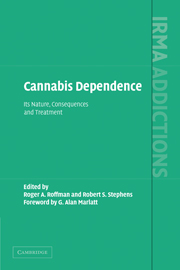Book contents
- Frontmatter
- Contents
- List of Contributors
- Acknowledgments
- Executive Summary
- Foreword
- Part I The Nature of Cannabis Dependence
- Part II Interventions with Cannabis-Dependent Adults
- 6 Cognitive-Behavioral and Motivational Enhancement Treatments for Cannabis Dependence
- 7 Contingency-Management Interventions for Cannabis Dependence
- 8 The Marijuana Check-Up
- 9 Guided Self-Change: A Brief Motivational Intervention for Cannabis Abuse
- 10 Supportive–Expressive Psychotherapy for Cannabis Dependence
- Part III Interventions with Cannabis-Dependent Adolescents and Young Adults
- Part IV Policy
- Part V Conclusion
- Index
8 - The Marijuana Check-Up
from Part II - Interventions with Cannabis-Dependent Adults
Published online by Cambridge University Press: 29 October 2009
- Frontmatter
- Contents
- List of Contributors
- Acknowledgments
- Executive Summary
- Foreword
- Part I The Nature of Cannabis Dependence
- Part II Interventions with Cannabis-Dependent Adults
- 6 Cognitive-Behavioral and Motivational Enhancement Treatments for Cannabis Dependence
- 7 Contingency-Management Interventions for Cannabis Dependence
- 8 The Marijuana Check-Up
- 9 Guided Self-Change: A Brief Motivational Intervention for Cannabis Abuse
- 10 Supportive–Expressive Psychotherapy for Cannabis Dependence
- Part III Interventions with Cannabis-Dependent Adolescents and Young Adults
- Part IV Policy
- Part V Conclusion
- Index
Summary
Among those in the USA who experience negative consequences from alcohol or drug use and who acknowledge a need for treatment, the number one reason given for not receiving treatment is “not being ready to stop using” (Substance Abuse and Mental Health Services, Office of Applied Sciences (SAMHSA), 2003b). The other most commonly endorsed reasons for not seeking treatment include the financial costs and stigma associated with drug abuse treatment. Embarrassment, stigma, and a negative attitude toward treatment were frequently endorsed in other studies of reasons for delaying seeking treatment (Cunningham et al., 1993; Sobell et al., 1991). Drug treatment appears to come with both social and financial costs and it is perceived as designed for those who are committed to change.
Marijuana users may be particularly unlikely to seek treatment for these very reasons. In addition, marijuana is often perceived as a “soft” drug that does not produce dependence or serious negative consequences, which may further undermine the apparent need for treatment (see Stephens & Roffman, 1993). Of those who met criteria for cannabis dependence or abuse in 2003, only 7.6% reported receiving treatment in drug treatment facilities. In contrast, 24.3% of those with cocaine abuse or dependence and 18.2% of those abusing or dependent on pain relievers reported receiving treatment (SAMHSA, 2003a). In this chapter we describe the Marijuana Check-Up (MCU), a low-cost and low-demand intervention designed to attract adult marijuana users who are experiencing some negative consequences but who are not necessarily committed to change.
Keywords
- Type
- Chapter
- Information
- Cannabis DependenceIts Nature, Consequences and Treatment, pp. 177 - 203Publisher: Cambridge University PressPrint publication year: 2006
- 1
- Cited by



